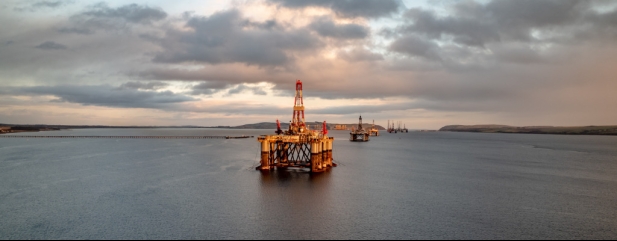Archived article
Please note that tax, investment, pension and ISA rules can change and the information and any views contained in this article may now be inaccurate.
Are Harbour Energy and its rivals bluffing about leaving the North Sea behind?

There was little doubt about the part of its latest results which Harbour Energy (HBR) wanted the market to focus on.
Whereas companies often look to flatter their headline profit numbers, the opposite seemed to be true when Harbour, previously known as Premier Oil, reported full-year results on 9 March. Pre-tax profit of $2.46 billion had effectively been wiped out by the energy profits levy with just $8 million left over.
Scratch below the surface and pleas of poverty do not stand up. The company generated free cash flow of $2.1 billion from which it was able to pay off more than half of its net debt and return $553 million to shareholders.
Harbour made what looked like a calculated accounting decision to book the impact of the energy profits levy all the way out to 2028 in its 2022 results.
The company, which has made it clear it will reduce headcount in the UK and could prioritise investments elsewhere, is not the only operator to decry the impact of the energy profits levy which effectively creates a headline tax rate of 75%.
Another major independent producer in the North Sea, Enquest (ENQ) is on record as saying it has deferred drilling on the Kraken field thanks to the windfall tax which it says will have an impact on its ‘capital allocation strategy and UK production growth ambitions’. AIM-quoted Serica Energy (SQZ:AIM) has made it clear it is looking elsewhere for opportunities, even though it still believes in the ‘importance’ of UK oil and gas.
Their concerns matter as these independents will have to play a central role if the UK’s remaining reserves of oil and gas are going to be exploited, with the big oil companies having already exited large parts of the North Sea.
When the levy was first announced in May 2022 Shore Capital analyst Craig Howie observed: ‘The chancellor has actually handled it reasonably sensibly and pragmatically – particularly through implementation of a significant investment allowance.’
The problem is an 80% investment allowance was effectively reduced to 29% on everything except ‘decarbonisation expenditure’ six months later and the period over which the tax applies was extended by two-and-a-bit years.
It is the constant tinkering with the tax set-up in the UK which is arguably the biggest problem for North Sea producers and the one most likely to drive investment elsewhere. Developing an oil or natural gas field is a multi-year commitment and you need to have certainty to be able to budget and plan effectively.
More than once over the years this author has heard oil executives compare the UK’s fiscal set-up and its instability unfavourably with locations you would think would be much more fraught with political risk. Food for thought.
Important information:
These articles are provided by Shares magazine which is published by AJ Bell Media, a part of AJ Bell. Shares is not written by AJ Bell.
Shares is provided for your general information and use and is not a personal recommendation to invest. It is not intended to be relied upon by you in making or not making any investment decisions. The investments referred to in these articles will not be suitable for all investors. If in doubt please seek appropriate independent financial advice.
Investors acting on the information in these articles do so at their own risk and AJ Bell Media and its staff do not accept liability for losses suffered by investors as a result of their investment decisions.
Issue contents
Feature
- Investing in AIM shares for inheritance tax relief? Don’t get caught out by these issues
- Are Harbour Energy and its rivals bluffing about leaving the North Sea behind?
- Why investing in your 60s doesn't mean the end of investing for capital growth
- Lifetime ISA: top investment strategies for your first home or retirement
- How investors can take part in company fundraisings as they dial up again

 magazine
magazine








